I found myself with a detective novel. I started An Exaggerated Murder in 2002. It's been altered, shuffled, changed, set aside for five years, rethought and rewritten. People have asked me about its origins and I've never had a good answer because I don't really remember how it started. (I suspect Trike and Lola's names came first, but where the names came from is a complete mystery.) I know I was reading pulp fiction and Poe. The detective character generally permeates our artistic and entertainment cultures. I might have started reading Conan Doyle by then. And, of course, Ulysses was in my head and Ulysses can make detectives of us all. I found myself with a marble slab of language and ideas whose contours suggested a detective story. It doesn't take much research to learn you've got to read The Maltese Falcon if you're an American attempting a detective story. (Especially if you want to put your detective in a trench-coat.)
Reading is not a homogeneous action. It is a genus of actions and interactions, relationships and efforts, dialogs and dialectics. You read differently when exploring a book's potential, as I did the first time I read The Maltese Falcon, than you when are interrogating it as a guide for your own creative endeavors, as I did the next five times I read The Maltese Falcon. In the later reading, every event is itself and its rationale, every image itself and its composition, every sentence, every line of dialog, every word, itself and the choice to include it.
Once I was familiar with the story, I was able to examine its composition directly, reading less for the art of the book and more for how the effect of art was generated. I paid attention to the words Hammett used to describe the characters and the setting. I looked at how information was given to the reader; whether it came from dialog, a statement by a character, or included in the narration. I listened to my own emotions and reactions and tried to isolate the exact sentences, and the emotional, information, and significant composition of those sentences, to determine, as much as possible, how Hammett made me feel and think what I felt and thought. I maintained a split consciousness with Josh the Reader relentlessly surveyed by Josh the Writer.
I underlined phrases. There is more color in a book you read for guidance. I transcribed the annotations in a notebook. Faces have more features. I subjected some annotations to study, others to alchemical permutations. Bodies have more dimensions. I reapplied those permutations in my book to join and sustain a conversation. Cities are more certain. I exploited connections. I expanded my lexicon. I closed my eyes and saw yellow-gray eyes even though I'm certain I've never actually seen yellow-gray eyes. I learned a thing or two about what to tell readers about what is going on. I mined the source for all its worth and ended up with a battered book and a notebook of additional potential.
But I didn't want to be Borges' Pierre Menard. Not every lesson was applicable. Not every reference productive. Not every storytelling technique was right for the story I was telling. There was far more in that notebook left out than incorporated. Some examples. Sam Spade is so consistently surrounded by demonic imagery, being described as looking like a “blond Satan,” you wonder if Hammett wants us to see him as a hero. The Maltese Falcon is deeply misogynist, yet includes Effie Perine, one of fiction's most inscrutable female characters. The hubris of knowing the truth. The playful character names. The choice between justice and love. The casually mysterious disappearance of Gutman's daughter. The difference between postmodernism and cynicism. The moment Sam Spade knew who killed Archer and the long wait before he told us. And then there's the falcon itself, the engine and fuel for all this conflict and death. I won't spoil it for those unfamiliar, so I'll just say that in 1929, Dashiell Hammett created one of the most coherent and evocative images of postmodernism in that lacquered statuette.
But if there was one particular moment in that first interrogative reading that showed me how much more The Maltese Falcon had than I needed for my project, it was the moment I re-examined the Flitcraft Parable. Spade tells a story about a man who had a near death experience and then completely vanished. The disappearance baffled the authorities and eventually the formal investigation was called off. A few years later, Flitcraft was found, in Spokane instead of Tacoma, but otherwise living the exact same life he'd lead before nearly being killed by a falling girder. It was not the complexity of the statement on identity that struck me, at least not in the course of this particular reading, but the fact of the digression in and of itself. Detective stories, including those inspired by The Maltese Falcon usually don't include idle conversation. And yet, here is a scene in which the characters are just killing time. Instead of an expository sentence or two getting them through the night and back to the action, we get a three-page parable about the nature of identity and its relationship to death-denial. Jesus Christ, a cornerstone text in the hardboiled detective fiction genre includes a three-page parable about the nature of identity and its relationship to death-denial.
As An Exaggerated Murder neared completion, I found myself with every specific needs from The Maltese Falcon and so read it in yet another way, this way closer to an archaeologist sifting sand for artifacts. In some ways, it could hardly be called reading at all and yet the archaeologist was easily vanished by the moments of art that resonate beyond detectives, con artists, and statuettes. When I read Spade saying, “If they hang you, I'll always remember you,” for the first time or the fifth time, my breath fell out of my body and it felt like underlining it would somehow be an affront.
At the beginning of a literary project, I see no benefit in tempering your ambition. There is no reward for humility in the first draft. Joyce should be in your sights. Your goal should be to write the greatest whatever it is that has ever been written. But, at some point, you have to grapple with what you've actually accomplished, to confront the work's actual potential, and then strive to make it the best whatever it is that you can write. When I confronted the actual potential of An Exaggerated Murder, I knew I needed a source of diction, technique, guidance, and inspiration and when I mined The Maltese Falcon as a source, I discovered another impossible target.
Showing posts with label Writing. Show all posts
Showing posts with label Writing. Show all posts
Tuesday, October 27, 2015
Tuesday, June 30, 2015
To Write is an Act of Life: On One Paragraph in The Argonauts by Maggie Nelson
There isn't much I'm prepared to write about in Maggie Nelson's brilliant new book, The Argonauts, because I simply have not spent the requisite time and close reading to truly unpack her treatise on gender, love, birth, death, parenting, and a whole host of other loaded, nuanced, and ambiguous concepts, all handled with Nelson's particular knack for productively not answering questions. To put this another way, Nelson is a writer to re-read. That said, as in Bluets, Nelson is somehow also able to construct crystalline moments that connect directly to my life and reading experience. Depending on who you are and how you read, those moments can be few and far between, but, for me at least, they are always present enough to impart momentum or even motivation for that longer, more rigorous process of internalization described above.
One paragraph in The Argonauts connected to or articulated something I had been thinking about for a long time, not a theory really, but just one of those concepts that rattles around in your head like a burr, until it finally gets stuck on some passing animal. Here's the relevant animal:
I don't think the world needs more writers. I'm not about to stop anybody from identifying as a “writer” however they want to define that identification, but “not protesting the existence of” and “demanding more of,” are very different stances. However, I do think the world is in desperate need of people who write. To put this another way; those who identify as “writers” aren't the only ones who can benefit from articulating their experience through writing. It is not about having good ideas or bad ideas, good experiences or bad experiences, good stories or bad stories, it is about the process of “articulation itself” acting as a force of revelation for what is being articulated. Here's why:
Writing Forces Your Brain Into a Dialog: The language part of your brain and the emotional part of your brain, regardless of how the neurology shakes out, are different. If they are not quite distinct, they at least have distinct voices. When you write about an experience or emotion, you transfer that experience from the feeling part of the brain to the language part of the brain and create a dialog between the two. One interrogates the other as you strive to accurately translate something that isn't inherently an act of language into an act of language. And dialog, even if it is just between distinct voices, can only improve your understanding of, well, pretty much everything, including your own thoughts, feelings, and experiences. Something is always revealed when a second (or third or fourth) voice engages an idea.
Writing Organizes Your Thoughts: There has to be a first word. Whether you're trying to write grammatical prose, poetry, or are just spewing language into a receptacle, there has to be a first word. And that first word must be followed by a second and a third. Even if you go no further, even if your moment of writing is just a string of words that string is order from chaos. Prose, even first draft, mistake-laden grammatically crippled prose, imposes a systemic method of thinking about whatever happened to you and whatever you feel about it. Even the most fluid, free-form, experimental poetry is order for chaos, system for random, substance from void. Regardless of the type of writing you use, writing forces you to make one decision over and over again: what to write next and the process of coming to that decision inherently creates systemic consideration of your topic. And the result is an organized thought.
Writing Creates an External Object: Once you've written something, you now have that writing outside of you to interact with. You have externalized whatever you were writing about into something stable. It can just stay with you, like a diary or a journal. You can let someone else read it and get their perspective. (Remember that whole dialog thing) Even if you don't plan to share it with the public you can still edit it. You can add to it. You can cross out indiscretions. You can burn it, frame it, enshrine it, decorate it, slowly and methodically tear it into confetti while your rage dissipates into a more manageable smoldering mass of anger. And, of course, you can read it. You can literally (literally) look down on your thoughts from a new perspective. (And probably discover you're being a selfish idiot, but, maybe that's just me.)
Writing Slows You Down: Thoughts and emotions can cascade with such speed that you can actually lose track of what it is you are thinking and feeling. Writing slows you down. Even if you're scrawling at a frantic pace, desperate to get it all down before the language evaporates, you've still slowed the electric pace of your brain to the manual pace of your scribbling or typing. You are probably sitting down. You are probably relatively still or in the process of becoming still. And if you take a moment and just sit after you've gotten whatever you need out of you out of you. And then if you read what you've written. And then if you take a moment to think about what you've read. I'm not saying this would be a miracle cure for most of the world's problems, but I am saying a lot of stupid phone calls, Facebook posts, and tweets would be avoided, to everyone's benefit.
I have had experiences, ideas, and emotions that I have simply not understood until I've written them down, usually in a poem. Sometimes those moments of writing as an act of self-understanding form the base of a piece I try to get published (after a rigorous editing process through which a conversation with the self is transformed into a conversation with the world, because if I didn't do that the poem, usually, would be meaningless drivel to everyone else) but most of the time, those moments have done their job. They have given language to something that did not have language. I imagine my relationship with language is somewhat atypical, but I still think the value of articulation is intrinsic.
The astute reader will note, none of what I just cataloged is actually in the quoted paragraph and, in the context of the book, Nelson's project in this paragraph is much different from my project in this blog post, but Nelson is getting at the inherent value of articulation, the idea that articulating/writing something gives you a new, and otherwise unavailable, type of power over whatever it is that you are articulating. My thoughts and Nelson's on this topic, meet only at this one point and then continue in their independent trajectories, but, that, to me, is one of the reason's why we read. Sometimes the briefest, glancing convergence and impact of thoughts and words is enough to solidify what was once vague in the reader's mind. And so through Nelson, I can write, “The act of writing protects you from your own bad ideas,” and though it is very different from Nelson's point, it is indebted to Nelson's own articulation.
One paragraph in The Argonauts connected to or articulated something I had been thinking about for a long time, not a theory really, but just one of those concepts that rattles around in your head like a burr, until it finally gets stuck on some passing animal. Here's the relevant animal:
Most of my writing usually feels to me like a bad idea, which makes it hard for me to know which ideas feel bad because they have merit, and which ones feel bad because they don't. Often I watch myself gravitating toward the bad idea, as if the final girl in a horror movie, albeit one sitting in a Tuff Shed at a desk sticky with milk. But somewhere along the line, from my heroes, whose souls were forged in fires infinitely hotter than mine, I gained an outsized faith in articulation itself as offering its own form of protection. (p123)
I don't think the world needs more writers. I'm not about to stop anybody from identifying as a “writer” however they want to define that identification, but “not protesting the existence of” and “demanding more of,” are very different stances. However, I do think the world is in desperate need of people who write. To put this another way; those who identify as “writers” aren't the only ones who can benefit from articulating their experience through writing. It is not about having good ideas or bad ideas, good experiences or bad experiences, good stories or bad stories, it is about the process of “articulation itself” acting as a force of revelation for what is being articulated. Here's why:
Writing Forces Your Brain Into a Dialog: The language part of your brain and the emotional part of your brain, regardless of how the neurology shakes out, are different. If they are not quite distinct, they at least have distinct voices. When you write about an experience or emotion, you transfer that experience from the feeling part of the brain to the language part of the brain and create a dialog between the two. One interrogates the other as you strive to accurately translate something that isn't inherently an act of language into an act of language. And dialog, even if it is just between distinct voices, can only improve your understanding of, well, pretty much everything, including your own thoughts, feelings, and experiences. Something is always revealed when a second (or third or fourth) voice engages an idea.
Writing Organizes Your Thoughts: There has to be a first word. Whether you're trying to write grammatical prose, poetry, or are just spewing language into a receptacle, there has to be a first word. And that first word must be followed by a second and a third. Even if you go no further, even if your moment of writing is just a string of words that string is order from chaos. Prose, even first draft, mistake-laden grammatically crippled prose, imposes a systemic method of thinking about whatever happened to you and whatever you feel about it. Even the most fluid, free-form, experimental poetry is order for chaos, system for random, substance from void. Regardless of the type of writing you use, writing forces you to make one decision over and over again: what to write next and the process of coming to that decision inherently creates systemic consideration of your topic. And the result is an organized thought.
Writing Creates an External Object: Once you've written something, you now have that writing outside of you to interact with. You have externalized whatever you were writing about into something stable. It can just stay with you, like a diary or a journal. You can let someone else read it and get their perspective. (Remember that whole dialog thing) Even if you don't plan to share it with the public you can still edit it. You can add to it. You can cross out indiscretions. You can burn it, frame it, enshrine it, decorate it, slowly and methodically tear it into confetti while your rage dissipates into a more manageable smoldering mass of anger. And, of course, you can read it. You can literally (literally) look down on your thoughts from a new perspective. (And probably discover you're being a selfish idiot, but, maybe that's just me.)
Writing Slows You Down: Thoughts and emotions can cascade with such speed that you can actually lose track of what it is you are thinking and feeling. Writing slows you down. Even if you're scrawling at a frantic pace, desperate to get it all down before the language evaporates, you've still slowed the electric pace of your brain to the manual pace of your scribbling or typing. You are probably sitting down. You are probably relatively still or in the process of becoming still. And if you take a moment and just sit after you've gotten whatever you need out of you out of you. And then if you read what you've written. And then if you take a moment to think about what you've read. I'm not saying this would be a miracle cure for most of the world's problems, but I am saying a lot of stupid phone calls, Facebook posts, and tweets would be avoided, to everyone's benefit.
I have had experiences, ideas, and emotions that I have simply not understood until I've written them down, usually in a poem. Sometimes those moments of writing as an act of self-understanding form the base of a piece I try to get published (after a rigorous editing process through which a conversation with the self is transformed into a conversation with the world, because if I didn't do that the poem, usually, would be meaningless drivel to everyone else) but most of the time, those moments have done their job. They have given language to something that did not have language. I imagine my relationship with language is somewhat atypical, but I still think the value of articulation is intrinsic.
The astute reader will note, none of what I just cataloged is actually in the quoted paragraph and, in the context of the book, Nelson's project in this paragraph is much different from my project in this blog post, but Nelson is getting at the inherent value of articulation, the idea that articulating/writing something gives you a new, and otherwise unavailable, type of power over whatever it is that you are articulating. My thoughts and Nelson's on this topic, meet only at this one point and then continue in their independent trajectories, but, that, to me, is one of the reason's why we read. Sometimes the briefest, glancing convergence and impact of thoughts and words is enough to solidify what was once vague in the reader's mind. And so through Nelson, I can write, “The act of writing protects you from your own bad ideas,” and though it is very different from Nelson's point, it is indebted to Nelson's own articulation.
Wednesday, January 15, 2014
The Pressures of a Really Good Notebook
When your family knows you're a writer you get notebooks for presents, especially when you are goddamn impossible to buy gifts for because you don't really want anything, except maybe books, but you work at a bookstore so it is folly to try to buy books for you. I still start a lot of projects by hand even though my penmanship is awful, so, it's pretty handy to get new notebooks roughly biannually. But notebooks are also very personal items. A notebook could be with me for years. I could be in physical contact with it for hundreds of hours over that time. When I'm writing in it, it is the most important object in my life. And if I think I have lost a particular notebook, the lexicon of my panic is equal parts “Ahhhhhhh! The words I have written!” and “Ahhhhh! The thing I have written my words in!” I've also been doing this long enough to develop habits, idiosyncrasies, and preferences, so that, though I always appreciate gifted notebooks, sometimes I get one and think “What the hell am I going to use this for?” (More on that later.)
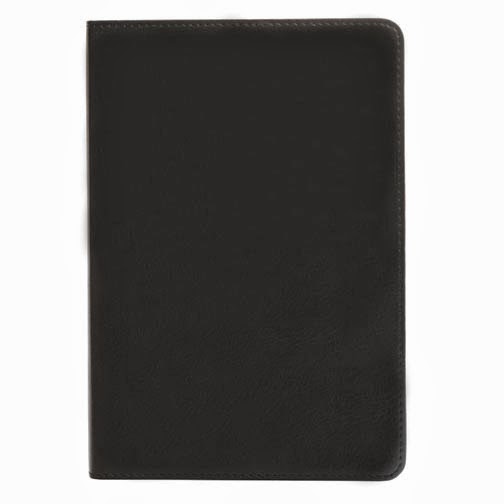 |
| This is a really good notebook. |
But sometimes the opposite is just as difficult. When I get a really good notebook, I feel pressure to write something that uniquely fits into the physics of that notebook. For example, pictured is a notebook I got this past Christmas. It has a nice weight to it, the flexible soft leather cover that has give and durability, and the lines are wide enough to accommodate my apocalyptically bad handwriting. Even though I'd probably describe it as pocket-sized, it is a little too large for an actual pocket, but would fit nicely in pretty much any sized bag, satchel, purse, etc. To put this another way, this notebook is absolutely begging for its own project.
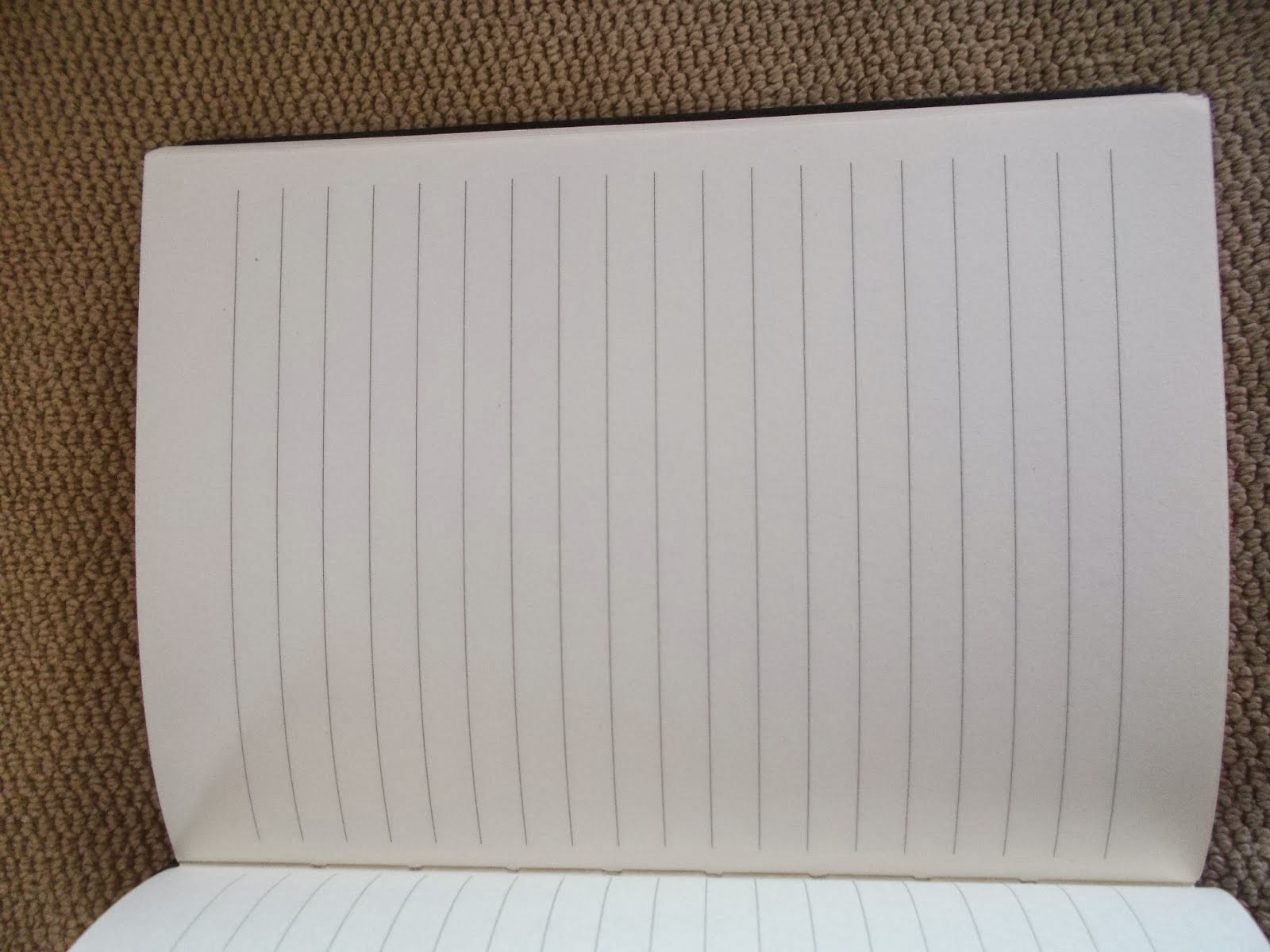 |
| O! The line spacing! |
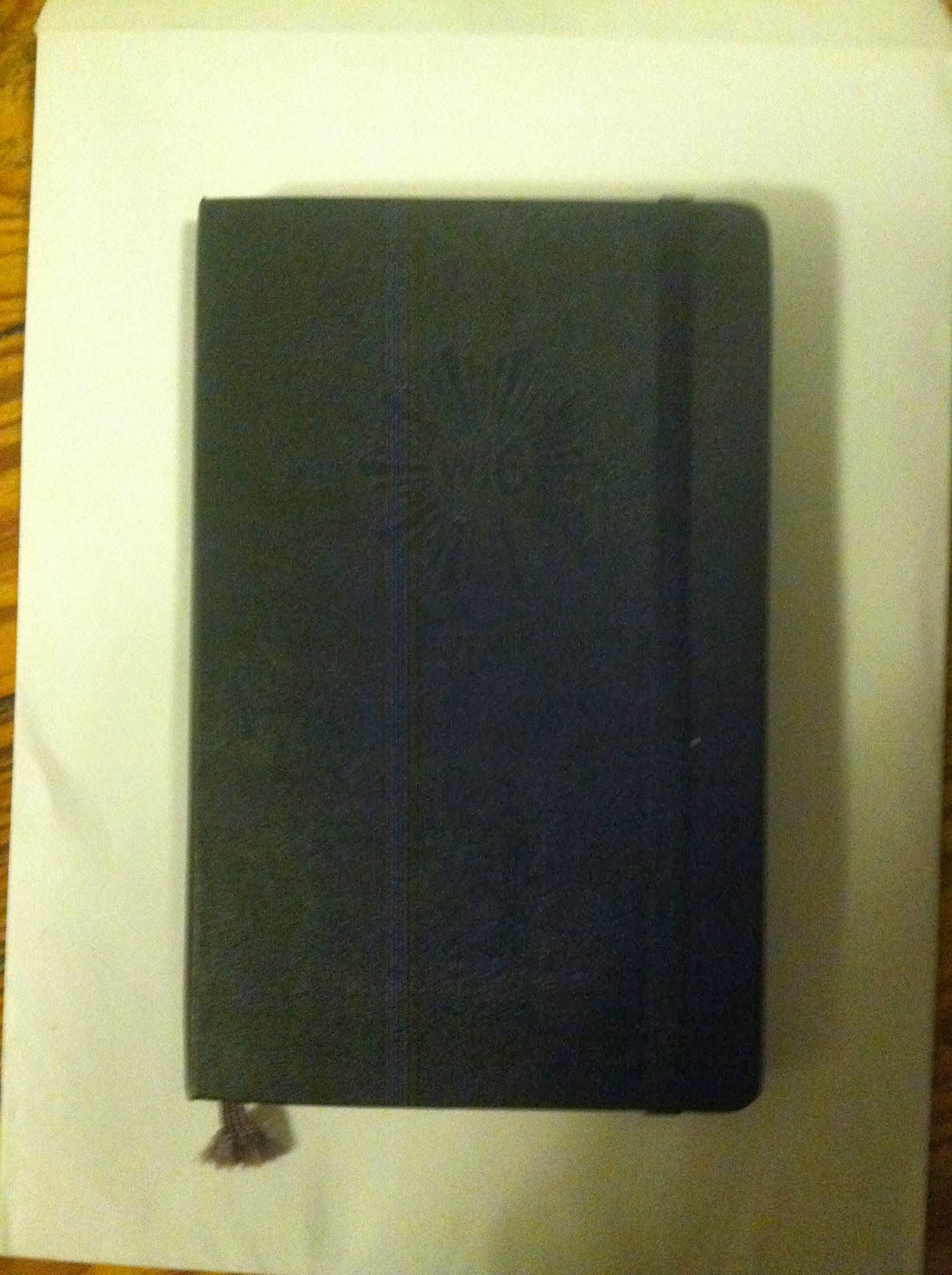 |
| No fuckin' way, dude. |
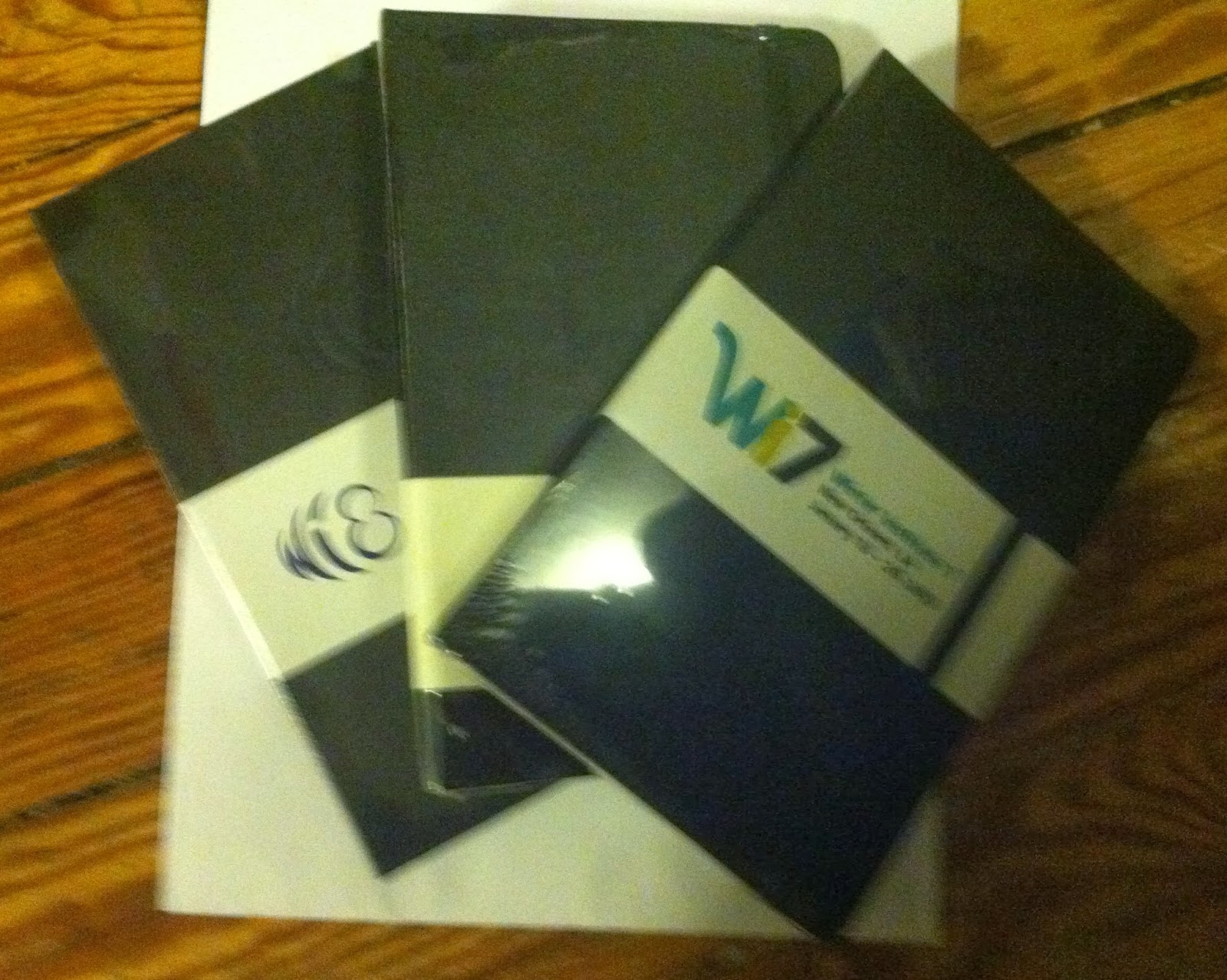 |
| Oh man, the keynote I will give if this becomes a real thing. |
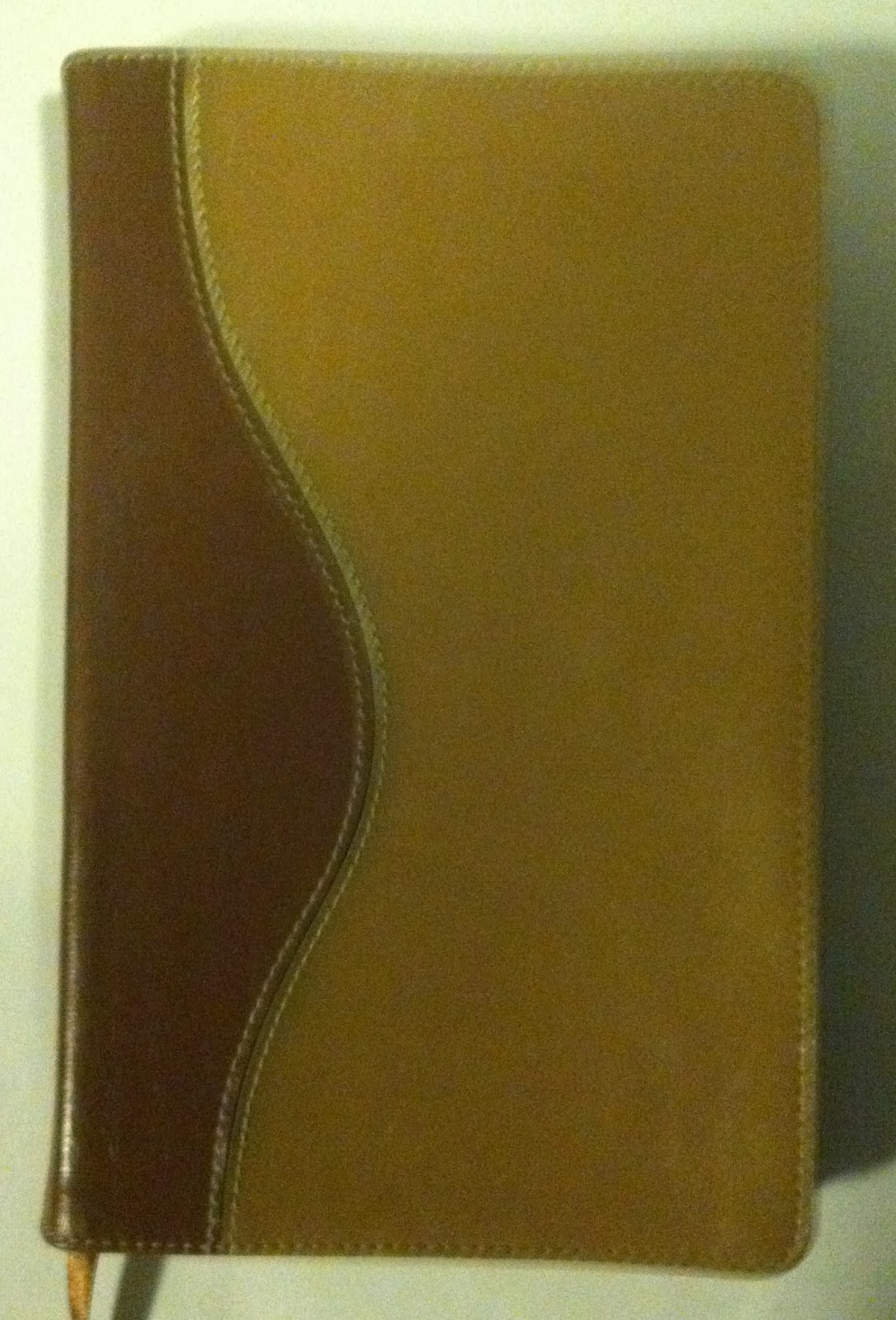 |
| Was 1/2 the union on strike? |
Of course, the problem with notebooks isn't always abundance. Sometimes, for absolutely rational reasons, none of the notebooks I have on hand are right for the project I want to start and I need, yes “need,” again for absolutely rational reasons, to buy one. Recently I started a project that had been in my head for ages, a collection of essays exploring The Maltese Falcon, and didn't have anything that made sense. Sometimes the search for a new notebook is stressful. Other times, my store sells dinosaur notebooks. And lo, the notebook envy did rain down upon me from all who beheld its splendor.
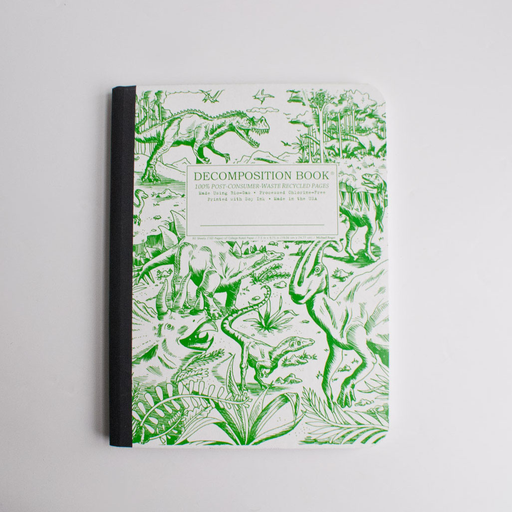 |
| Dinosaur Notebook, bitches! |
So the notebook that started this post is just sitting there on my desk, looking at me, describing to me the nature of the project that belongs in it. A novella maybe, crank out a pulp novella over a week or so, maybe, though until my novel is done I can't commit to anything like that, or maybe another long poem, as I've had success with those in the past, or maybe a journal for a long trip (it is an “Ecco World Traveler” after all), though I don't have one of those planned for a while, though it's not like it will decompose before my next one... So yes, right now, an object is talking to me.
We are emotional beings and we interact emotionally with, well, everything, including the objects in our world. The more emotions there are in whatever you are doing, and there are a lot of emotions in writing (and reading) the more likely you will form an emotional connection with the objects of that activity. (I'm pretty sure a few of my poems are sub-conscious odes to my USB Buckling Spring keyboard.) And the longer you have an object, the more it begins to take on an emotional character in your eyes. Essentially, the entire world is a container for out emotions. So, though in a very rational, practical, indisputable way, it is ridiculous to feel pressured by a particularly good notebook, in a human way, and in particular in a human writer way, it is perfectly natural.
Subscribe to:
Posts (Atom)


